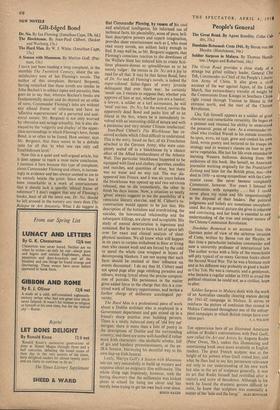People's General
The Great Road. By Agnes Smedley. (John Cal- der, 35s.) Daedalus Returned: Crete 1941. By Baron von der Heydte. (Hutchinson, 16s.) Soldier Surgeon in Malaya. By Thomas Hamil- ton. (Angus and Robertson, 16s.) The Great Road provides a close study of a strange but gifted military leader, General Chu Teh, Commander-in-Chief of the People's Libera- tion Army of China. It also gives a vivid account of the war against Japan, of the Long March, that extraordinary transfer of weight by the Communists from Kiangsi in Southern China right round through Yunnan to Shansi in the extreme north, and the start of the Chinese Revolution.
Chu Teh himself appears as a soldier of great character and remarkable versatility. He began as a peasant and retained his ability to understand the peasants' point of view. As a commander-in- chief who rivalled Wavell in his outside interests, he spun, wove, set type, grew and cooked his own food, wrote poetry and lectured to his troops on strategy and to women's classes on how to pre- serve vegetables. His lust for life even extended to learning Western ballroom dancing from the authoress of this book. She herself, an American journalist working originally for the Frankfurter Zeitung and later for the British press, was—she died in 1950—a strong sympathiser with the Com- munist cause. She never became completely Communist, however. 'For years I listened to Communists with sympathy . . . but I could never place my mind and life unquestioningly at the disposal of their leaders.' Her political judgments and beliefs are sometimes unsophisti- cated. But the general picture she gives is coherent and convincing, and her book is essential to any understanding of the true and unique nature of the Chinese Communist Revolution.
Daedalus Returned is an account from the German point of view of the airborne invasion of Crete, written by Baron von der Heydte, at that time a parachutist battalion commander and now a university professor of international law. The author writes with a little of the masochistic self-pity typical of so many German books about the Second Word War. Yet he was a humane man and in his different way probably as good a leader as Chu Teh. He was a romantic and a gentleman, who became a regular soldier in 1933 to avoid the political situation he could not, as a civilian, hope to alter.
Soldier Surgeon in Malaya deals with the work of an Australian casualty clearing station during the 1941-42 campaign in Malaya. It serves to reinforce the picture of confusion that existed in Malaya Command throughout one of the unhap- piest campaigns in which British troops have ever taken part. A. J. WILSON THE appearance here of an illustrated American edition of Rodin's conversations with Paul Gsell, now called On Art and Artists, by Auguste Rodin (Peter Owen, 50s.), makes this illuminating and entertaining book once more available to English readers. The great French sculptor was at the height of his powers when Gsell visited him, and what he then had to say has permanent relevance not only to our understanding of his own work but also to the art of sculpture generally. It was an art that Rodin himself had revivified after a century and more of decadence. Although in his work he found the dramatic gesture difficult to resist, he knew that sculpture was essentially a matter of the 'hole and the lump.' ALAN BOWNESS






























 Previous page
Previous page